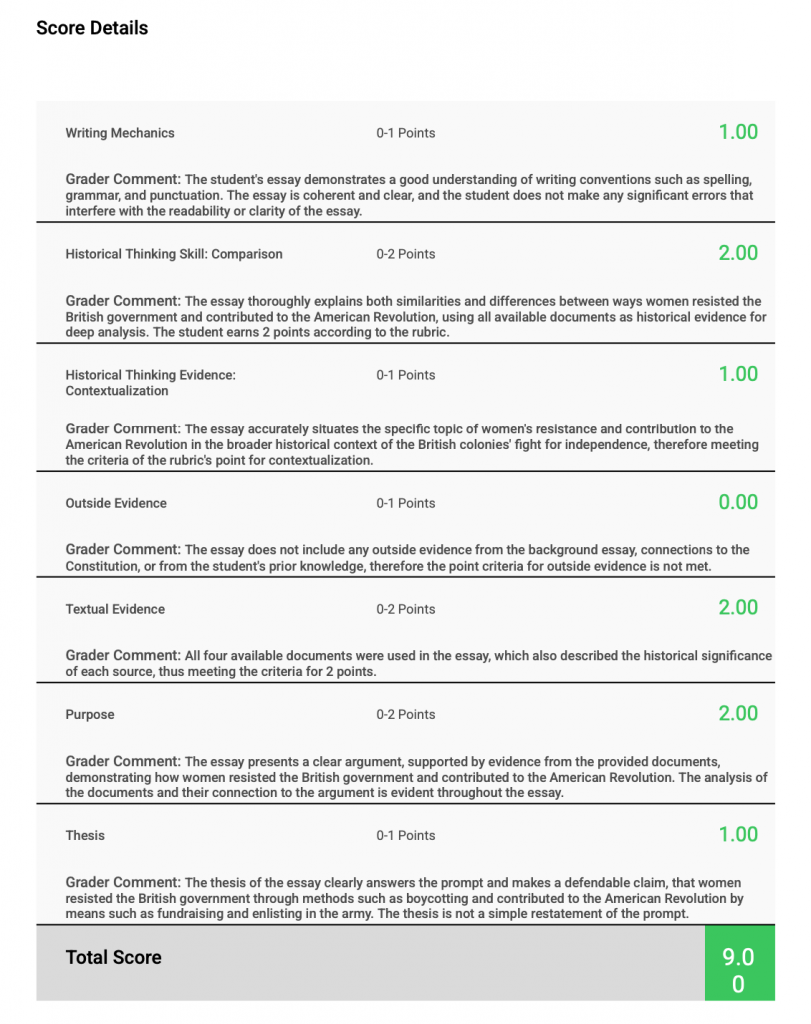One helpful way to understand the historical thinking skill of continuity and change over time is through turning points in history. Well, this week was a turning point in our own organization’s history. This weekend, we transitioned to Artificial Intelligence for grading essays. As I’ll address below, the human touch is still very much present, but we have spent the last few months working on the AI’s infrastructure and coding to give teachers and students detailed and instant feedback on the essays they write for our Curated Research Papers. We’ve tapped into AI to go beyond assessing memory of the past to using AI to assess historical thinking.
In the future, I’ll write more at length as to why this will be so transformational, but I do want to make the primary reason known right away: We can give students instant feedback and scores on complex writing tasks by programming the AI to assess the writing in the ways we tell it too. The level of detail in feedback that used to only be possible for the super humans among us can now be given to every student, every time. It’s remarkable. AI can enhance historical thinking
Simply, we can incentivize the type of inquiry-based lessons and assessments that we all know to be essential for real understanding without using up so much of our teachers’ outside-of-class time toward grading, or the time it took for our own graders to go through 1000s of essays that may come in any given week.
So what does this look like for Thinking Nation? From the inception of our organization, we always knew that removing the barrier of time spent grading for teachers was critical to shift the paradigm of social studies education. We also knew that social studies lacked key data metrics that could be used to appropriately assess student understanding within our discipline. This is why we’ve always graded the student essays for our partner teachers.
Our goal was to give students detailed feedback and teachers data reports on student learning without burdening the teacher with losing 12 hours of their weekend to grading essays. As we’ve grown, though, doing this consistently and timely has become harder. Then ChatGPT came out a year ago. We began to see that, given the right prompts, AI could give robust feedback to complex writing tasks with remarkable accuracy. After that, we began to plan out how we could do this for our own CRPs.

Now, once a student submits their essay, our AI instantly grades it, providing detailed feedback for every single category on the rubric. We know that AI comes with its own set of issues of course, so we still have all of our essays run through human eyes to check on AI’s understanding of our rubrics, for any bias in the programming, and language of the feedback given. We’ll be continuing to refine the algorithm based on the feedback from our (human) graders in an effort to give students immediate detailed feedback on their argumentative writing.
This new addition of AI will only further help our mission to shift the paradigm of social studies education. With immediate and detailed feedback, teachers can have students reflect on their writing in real time, enhancing students’ metacognition that is essential for the discipline itself to be cemented in their minds. AI is a game changer for enhancing historical thinking and we are really excited to provide our partner schools with a way to better shift the paradigm of social studies education.